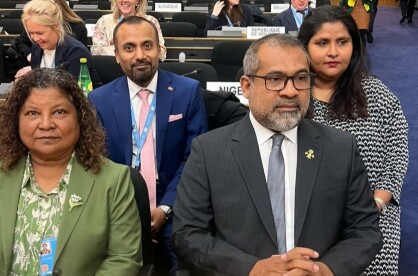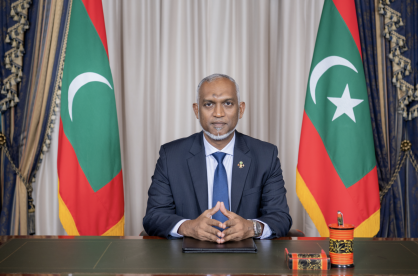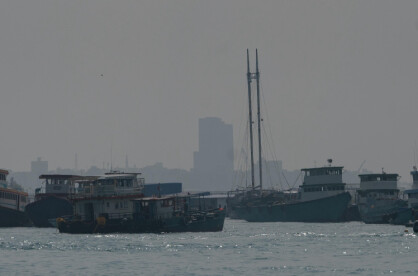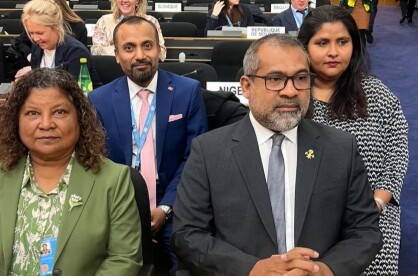The man who knew (too much)
The even application of the law, and justice, evades some more than most; especially when they have unequalled, privileged, access that others can only dream of.

The even application of the law, and justice, evades some more than most; especially when they have unequalled, privileged, access that others can only dream of.

On 19 May 2011, Ali Waheed, then-MP and Deputy Leader of the Dhivehi Rayyithunge Party (DRP), the main opposition party led by former President Maumoon Abdul Gayyoom, resigned from the party. In 2009, at the age of 24, he had been elected as an MP for the Thoddoo constituency on a DRP ticket. The DRP, on the same day that he resigned, lodged a case with the Anti-Corruption Commission (ACC), alleging that the ruling Maldivian Democratic Party (MDP) was bribing parliament members into defecting to the MDP.
On 20 May 2011, MP Ali Waheed, at a huge party gathering in Malé, signed a membership form to join the MDP. The gathering was attended by then-President Nasheed and many of his cabinet ministers and party members. On 9 June 2011, the MDP also held another mega event in Thoddoo to celebrate Ali Waheed’s defection. Again, the President Nasheed himself, together with MPs and ministers participated in the event that was cast live on a prominent party aligned TV channel. This event was where Nasheed danced in public to a local Boduberu song, and was highly chastised by the opposition for doing so. Such was the euphoria among the MDP party leadership and grassroot members, as Ali Waheed was seen as very vocal, articulate, and capable of making instant headlines both from inside the parliament chamber and on the streets.
Ali Waheed defected to the MDP along with a few others, at a time when MDP desperately needed a parliamentary majority – the government was, at that time, in the middle of major economic reforms, which required the passage of various tax, and several other, laws with significant economic and social implications.
With MP Ali Waheed joining the ruling MDP, a lot of opportunities were suddenly presented to him. This included his appointment as manager of the Maldives national football team on 6 July 2011.
That was not all. On 18 August 2011, MP Ali Waheed announced via a statement that he had purchased a plot of land – of 1,539 ft² in size in Hulhumalé – for a staggering MVR4.6 million. The statement was released following a series of local newspaper articles reporting on his purchase. On the same day, the Housing Development Corporation, through its website revealed that Ali Waheed’s wife had also booked a plot of land for purchase in Hulhumalé, priced at MVR4.7 million.
On 13 November 2011, a local newspaper reported that Ali Waheed’s mother had purchased a plot of land in Malé at an eye watering MVR7.9 million.
On 7 February 2012, President Nasheed’s presidency came to an end through what the MDP continues to claim was a coup. Ali Waheed played a crucial role in the leadership of the MDP during the ‘transitional’ presidency of Waheed that followed, until 17 November 2013, and the first two years of President Yameen's presidency. He was subsequently elected Chairperson of the party.
On 1 May 2015, the united opposition, which included Sheikh Imran Abdulla, the Leader of the Adhaalath Party, currently Minister of Home Affairs, and Qasim Ibrahim, leader of Jumhooree Party, together with the MDP, organised a major political protest on the streets of Malé against the Yameen administration. This was almost two months after former President Nasheed was sentenced to 13 years in prison on trumped up terrorism charges.
Following the protests, Ali Waheed, who was also at the protest, was arrested, along with other opposition leaders. Unlike Sheikh Imran and others, Ali Waheed was soon released on 24 May 2015. He quickly took advantage of the situation and fled the country, taking refuge in the United Kingdom. He was joined by President Nasheed in early 2016, when the Yameen administration authorised a 30-day travel permit for Nasheed to seek medical treatment.
Although Ali Waheed resigned from the post of Chairperson of MDP while in exile, he played an active role in the opposition, along with President Nasheed and other political leaders like Qasim Ibrahim and Ibrahim Mohamed Solih. He was engaged in almost all major negotiations and political settlements, and compromises with the then-government.
As a result, when President Solih was sworn-in on 17 November 2018, Ali Waheed, now aged 34, was immediately appointed Minister of Tourism. Again, as was with the previous MDP government, along came various other ‘perks’ and privileges, including the appointment of his wife to a political posting at the Ministry of Foreign Affairs, at the rank of deputy minister on 18 March 2019.
As Tourism Minister, Ali Waheed was seen as one of the most influential ministers within the government, with good relations with President Solih. This was evident when in February 2020, a series of audio files with inappropriate and lewd comments made by Ali Waheed towards Transport Minister Aishath Nahula, made during a telephone conversation between them leaked. Nahula, also the wife of coalition partner Qasim, had made the call to discuss official matters. President Solih, however, chose not to take any action against Ali Waheed, and continued public events with him, as if nothing had happened.
In July 2020, several staff at the Ministry of Tourism made allegations of sexual harassment and assault against Ali Waheed. The situation had gotten so bad for the staff that some of them met with President Solih in person to lodge their complaints against their minister. News websites reported that the President had been left in 'tears' and 'speechless' after hearing the accounts of the victims. The situation left the President with little choice but to ask Ali Waheed to resign immediately. When he refused to resign, President Solih finally removed Ali Waheed from his post on 9 July 2020. Giving the option for a minister who had sexually assaulted his staff, something that had fallen under Solih's 'Zero Tolerance' label, to resign instead of immediately sacking him raises its own questions.
Later the same month, the state charged Ali Waheed with sexual harassment & assault, indecent exposure, and soliciting sexual favours, and the courts prohibited him from travelling out of the country.
Unsurprisingly, given Ali Waheed's influence and power, President Solih on 11 November 2020 in a television program, expressed his best wishes to the disgraced former minister and said that he had a bright political future. Solih also said that he, along with his team, will facilitate and assist Ali Waheed in his endeavours.
On 8 February 2021, in a series of confusing events and accounts, and under restrictive pandemic travel conditions, the courts released Ali Waheed's passport. He fled the country immediately, although there still remain questions as to whether he fled the day before the court had ordered the release of his passport. He reportedly first left for Turkey and is now in the United Kingdom and deemed it unimportant to return for a court mandated date. At his request, the courts have arranged for his trial to be held online, although the Prosecutor General has repeatedly said that this was not in accordance with the court's stated policies on online hearings. The Ministry of Foreign Affairs has confirmed, somewhat laughably, that Waheed actually participated in hearings while present at the Maldives' High Commission in the UK.
While Ali Waheed roams free in the UK, the State appears unable and unwilling to do anything towards a meaningful progression in his case; failing to ensure his return to the Maldives to face trial while in actuality, as clearly seen from the fiasco of him participating in hearings from the High Commission, facilitating his stay in the UK. The drama around Ali Waheed has gotten so convoluted that the public are, perhaps in line with the intentions at play, losing interest in the case, certain in the fact that the powerful can get away with anything.
Still, the victims of his abuse, and assault, will never lose interest in ensuring that justice is done.
For an administration that takes 'chests out' pride in 'Zero Tolerance' of corruption and abuse of power, how is it that the nation is now forced to march to Ali Waheed's drum? Could it be that he is still too powerful because of what he ‘knows’ and what he is capable of doing with that knowledge?



